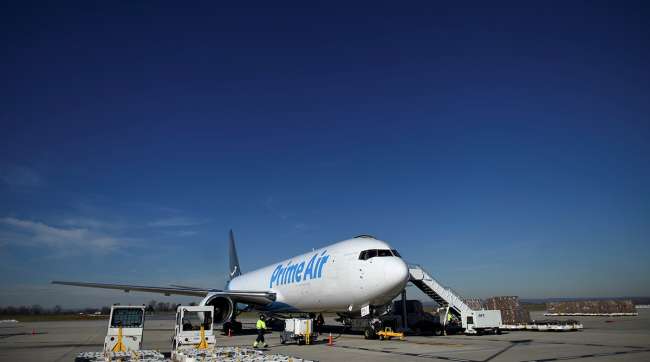Amazon Poised to Propel Cargo Business at Illinois’ Rockford Airport

ROCKFORD, Ill. — Cargo business is poised to maintain its upward trajectory at Rockford’s airport, which has positioned itself as a spoke in the airfreight network that Amazon is building so it can deliver its products without relying solely on traditional shippers such as UPS and FedEx.
UPS ranks No. 1 and FedEx No. 2 on the Transport Topics Top 100 list of the largest North American for-hire carriers.
The online retail behemoth began building its own shipping and logistics infrastructure more than a year ago when it leased 20 cargo jets from ABX Air and 20 more from Atlas Air. Amazon freight flown by both companies is routed daily through Chicago Rockford International Airport.
The airport earns about $541,000 a year by renting an 80,000-square-foot cargo terminal to LGSTX, an affiliate company of ABX Air. Airport officials broke ground July 9 on a 120,000-square-foot expansion of that building, which would allow ABX Air and Atlas to route more of Amazon’s cargo through Rockford.
The cargo building expansion represents the airport’s latest attempt to fulfill its vision of becoming a Midwest hub for e-commerce airfreight. Approximately 400 jobs will be added when the warehouse expansion wraps up a year from now. Airport officials expect cargo activity to spur even more jobs in the future.
RELATED: E-commerce fuels cargo surge at Chicago Rockford International Airport
Lease terms for the larger building have yet to be finalized, said Airport Director Mike Dunn. The airport would sell bonds to finance the $10 million expansion and repay the debt with rent income, he said.
Rockford’s airport is among many spokes in the logistics network that Amazon is building, with an airport in Covington, Ky., serving as a hub. The $1.5 billion global air hub that Amazon has established at Cincinnati/Northern Kentucky Airport eventually will accommodate up to 200 daily takeoffs and landings by the Amazon Prime Air fleet and will be large enough to host 100 of its aircraft, according to an Aircargoworld.com report.
ABX and Atlas cargo jets — many of which are colored with Amazon’s Prime Air logo — fly daily from the Kentucky Airport to Rockford. The proximity of Rockford’s airport to Chicago makes it attractive to cargo operators that want to avoid the hassle of shipping Midwest-bound cargo through O’Hare International Airport, which is among the world’s busiest and most congested airports, said Warren Jones, executive director of The International Air Cargo Association. The Miami trade association represents airports, freight airlines and related cargo businesses.
RELATED: Amazon enlists delivery startups to help expand shipment volume
“What Amazon is doing with its product is all about fast delivery, so they’re going to look at whatever their best option is to deliver quickly to their market,” said Jones, a former aviation development manager at Hartsfield-Jackson Atlanta International Airport.
“And Rockford is a viable option for Amazon, a realistic option, because you don’t have all the congestion that you have at O’Hare,” he said. “Your proximity to Chicago is important when you look at traffic congestion, lease holds for cargo buildings and availability of workforce.”
Besides Rockford, Amazon Prime Air flights are flying to airports in Ontario, Calif.; San Antonio; Seattle and Charlotte, N.C., among others. Cargo activity swelled at Tampa International Airport — another spoke in Amazon’s airfreight network — after the online retailer built distribution centers in the nearby central Florida communities of Ruskin and Lakeland in 2014.
In 2015, Tampa claimed the nation’s 53rd biggest cargo airport in terms of landed freight volume. Its ranking improved to 39th in 2016 as cargo volume increased 38.5% to 587 million pounds, according to the Federal Aviation Administration.
Rockford’s airport has enjoyed an even larger bump in cargo activity since ABX Air began shipping freight for Amazon in 2016. More than 1.3 billion pounds of cargo made its way through the airport last year, a nearly 50% increase over 2016. It is the nation’s 31st busiest cargo airport in terms of volume — a ranking that is certain to climb higher when the federal government releases its 2017 cargo data in October.
The long-term result of expanding cargo business at an airport like Rockford’s is “more jobs and more development,” Jones said. “There’s a multimillion-dollar trickle-down effect,” he said.
Distributed by Tribune Content Agency, LLC

